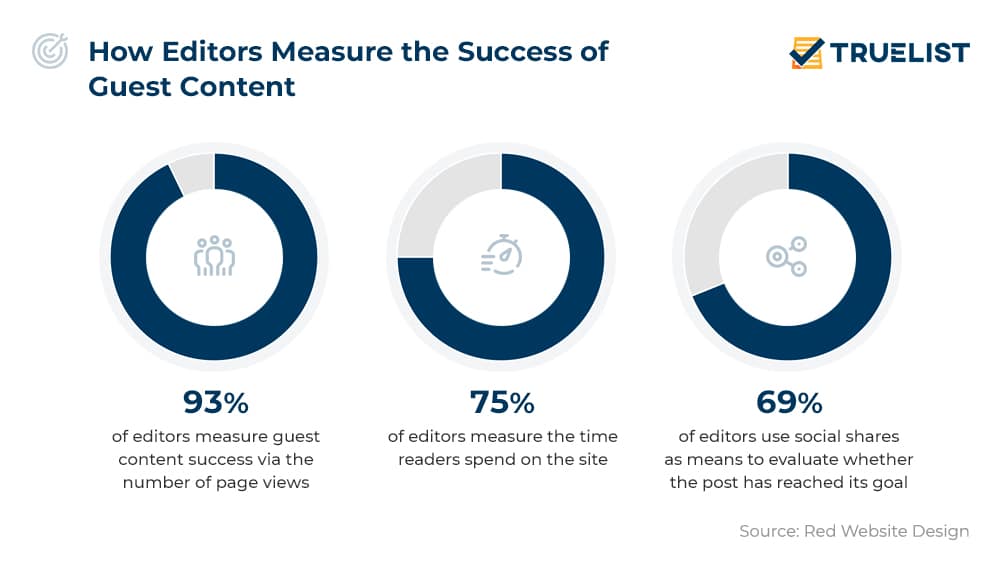To measure guest blogging success, track website traffic, backlinks, and engagement metrics. Focus on audience growth and conversion rates.
In the competitive world of content marketing, guest blogging has become a strategic tool for increasing brand visibility and driving targeted traffic to websites. However, measuring the success of guest blogging efforts can be challenging. Understanding the key metrics and KPIs to measure the effectiveness of guest blogging is crucial for optimizing your content marketing strategy.
By tracking website traffic, backlinks, and engagement metrics such as social shares and comments, you can gauge the impact of your guest posts. Additionally, focusing on audience growth and conversion rates will provide insight into the overall ROI and success of your guest blogging efforts. We will explore the essential steps and metrics for measuring guest blogging success to help you refine your content strategy and achieve your marketing goals.
Setting Goals
When it comes to measuring the success of your guest blogging efforts, setting clear goals is crucial. By establishing objectives and defining key performance indicators (KPIs), you can effectively evaluate the impact of your guest posts and determine the overall effectiveness of your guest blogging strategy.
Establishing Objectives
Before diving into a guest blogging campaign, it’s essential to establish clear and measurable objectives. These objectives should align with your broader marketing and business goals, such as increasing brand awareness, driving website traffic, or generating leads. By setting specific goals, you can effectively track the success of your guest blogging efforts and determine the return on investment (ROI) of your time and resources.
Defining Key Performance Indicators (KPIs)
Once you have established your objectives, it’s important to define the key performance indicators (KPIs) that will help you gauge the success of your guest blogging activities. These KPIs may include metrics such as website traffic, referral traffic from guest posts, social shares, lead generation, or backlinks acquired. By identifying and tracking these KPIs, you can gain valuable insights into the performance of your guest posts and make data-driven decisions to optimize your future guest blogging efforts.

Credit: www.searchenginepeople.com
Monitoring Website Traffic
Evaluating guest blogging success involves monitoring website traffic to gauge the impact of the published content. Tracking metrics such as page views, session duration, and referral sources provides insight into audience engagement and reach. Utilizing tools like Google Analytics helps in understanding the effectiveness of the guest blog posts.
Monitoring website traffic is a crucial aspect of measuring the success of your guest blogging efforts. By analyzing the traffic coming to your website, you can determine the effectiveness of your guest posts in terms of generating visibility and attracting potential customers. In this section, we will explore two key components of monitoring website traffic: tracking referral traffic and analyzing organic traffic growth.
Tracking Referral Traffic
One of the primary ways to measure the success of your guest blogging activities is by tracking the referral traffic to your website. Referral traffic refers to the visitors who find your website through a link on another website, such as a guest post that you have published. To track referral traffic, you can use tools like Google Analytics. By setting up and monitoring the referral traffic report in Google Analytics, you can identify the specific websites that are sending traffic your way through your guest posts.
Analyzing Organic Traffic Growth
Another important aspect of measuring guest blogging success is analyzing the growth of organic traffic to your website. Organic traffic refers to the visitors who find your website through search engine results, without any paid advertising. By monitoring organic traffic, you can assess how well your guest posts are performing in terms of increasing your website’s visibility in search engine rankings.
To analyze organic traffic growth, you need to monitor key metrics like the number of organic sessions, organic keywords, and organic search traffic trends. Tools like Google Analytics provide detailed reports on these metrics, allowing you to see if there are any significant increases or decreases in organic traffic after publishing guest posts.
Monitoring website traffic is essential for measuring guest blogging success. By tracking referral traffic and analyzing organic traffic growth, you can gain valuable insights into the impact of your guest posts and make data-driven decisions to optimize your guest blogging strategy.
Engagement Metrics
Measure guest blogging success by tracking engagement metrics like click-through rates, social shares, and comments. Analyzing these indicators helps determine the impact and effectiveness of your guest posts in driving traffic and increasing brand visibility. Use these metrics to optimize future guest blogging strategies for better results.
Measuring Average Time On Page
One of the key engagement metrics to assess the success of your guest blogging efforts is measuring the average time on the page. This metric provides valuable insights into how effectively your content engages and holds the attention of your website visitors. When visitors spend more time on your guest post, it indicates that they find the content interesting and engaging.
To measure the average time on page, you can use Google Analytics. Simply navigate to the “Behavior” section and click on “Site Content,” followed by “All Pages.” Here, you’ll be able to see the average time on page for each guest post.
A high average time on page indicates that visitors are spending a considerable amount of time reading your guest post. This signifies a successful guest blogging campaign, as it shows that your content is valuable and engaging enough to capture and keep readers’ attention.
Assessing Bounce Rate
Bounce rate is another crucial engagement metric that helps measure the success of your guest blogging efforts. Bounce rate refers to the percentage of visitors who navigate away from your website after viewing only one page. A high bounce rate typically indicates that visitors did not find what they were looking for or did not find the content engaging enough to explore further.
You can assess the bounce rate for your guest posts using Google Analytics. Head to the same “Behavior” section and click on “Site Content” followed by “All Pages.” Here, you’ll be able to see the bounce rate for each guest post.
A low bounce rate is indicative of a successful guest blogging campaign. It suggests that visitors are finding your content relevant and compelling enough to stay and explore your website further. A high bounce rate, on the other hand, highlights areas where you may need to optimize your guest blog content to improve engagement and encourage visitors to stay longer.
Analyzing engagement metrics such as average time on page and bounce rate is vital to measure the success of your guest blogging efforts. These metrics provide valuable insights into how effectively your content engages your audience and whether it encourages further exploration of your website. By continuously monitoring and optimizing these metrics, you can ensure that your guest blogging strategy yields the desired results, driving more traffic, and boosting your brand’s online presence.
Lead Generation
Discover effective strategies to assess guest blogging success through lead generation metrics. Measure impact across traffic, conversions, and engagement for a comprehensive evaluation. Optimize guest posting campaigns based on tangible data insights for continuous growth.
Guest blogging is not just about gaining exposure for your brand; it’s also a powerful tool for generating leads. By strategically placing your content on relevant websites, you can effectively reach your target audience and entice them to take action. Lead generation is a key element of guest blogging success, as it allows you to turn website visitors into potential customers. To measure your performance in lead generation, there are a few key metrics that you should track and analyze.
Tracking Conversion Rates
One of the most important metrics to measure the success of your guest blogging efforts is conversion rates. Conversion rates provide insight into how many of your website visitors take the desired action, such as signing up for a newsletter or making a purchase. Tracking conversion rates allows you to determine the effectiveness of your guest posts in driving actual results. To track conversion rates accurately, you can implement conversion tracking codes or utilize analytics tools such as Google Analytics.
Analyzing Click-through Rates (ctrs)
In addition to measuring conversion rates, analyzing click-through rates (CTRs) is another valuable metric when it comes to lead generation. CTRs indicate how many people are clicking on the links within your guest blog posts and transitioning to your website. A high click-through rate signifies that your content is compelling and triggers interest in your target audience. To analyze CTRs, you can monitor the performance of your links using UTM parameters or tracking pixels.
You can utilize analytics tools to gain insights into the click-through behavior of your audience. measuring lead generation success in guest blogging requires careful tracking and analysis of metrics like conversion rates and click-through rates. By paying close attention to these metrics, you can assess the effectiveness of your guest posts in driving actual results and attracting potential customers. So, don’t neglect lead generation when evaluating the success of your guest blogging efforts.
Social Media Impact
Social media impact plays a crucial role in determining the success of your guest blogging efforts. By effectively leveraging social media, you can amplify the reach of your content and drive valuable traffic to your site. Monitoring social shares and analyzing social media referral traffic are key metrics in evaluating the impact of your guest blogging strategy.
Monitoring Social Shares
Tracking social shares allows you to gauge the virality of your guest posts. By monitoring platforms like Facebook, Twitter, and LinkedIn, you can measure engagement and assess the reach of your content.
Analyzing Social Media Referral Traffic
Analyzing social media referral traffic provides valuable insights into how effective your guest blogging campaign is at driving visitors to your site. Use tools like Google Analytics to track click-through rates and conversion metrics from social channels.
SEO Performance
Understanding the impact of guest blogging on SEO performance is crucial for measuring success. Here we delve into evaluating backlink quality and assessing keyword rankings to gauge the effectiveness of your guest blogging efforts.
Evaluating Backlink Quality
Backlinks from high-authority sites hold significant weight in improving your website’s SEO. To evaluate backlink quality, consider the domain authority and relevance of the linking site.
- Domain Authority plays a pivotal role in determining the quality of a backlink
- Relevant backlinks from industry-related sites are more valuable
Assessing Keyword Rankings
Monitoring keyword rankings post-guest blogging can provide insights into the impact on search visibility. Track target keywords and observe fluctuations to gauge the effectiveness of your guest posts.
- Regularly check keyword rankings to assess changes post guest blogging
- Observe any upward movement in rankings for targeted keywords
Optimization
Interpreting data for actionable insights and continuous improvement strategies are crucial for optimizing the success of guest blogging efforts. By understanding the metrics and leveraging the data to refine your approach, you can continually enhance the impact of your guest blog posts on your target audience and overarching marketing goals.
- Utilize Google Analytics to track traffic and engagement metrics, including bounce rate, average session duration, and pages per session.
- Assess the click-through rates and conversion rates of guest blog links, pinpointing which posts yield the most conversions.
- Analyze social media shares, comments, and backlinks generated by each guest blog, identifying the most resonant content pieces.
- Implement UTM parameters to measure the effectiveness of guest blog posts in driving traffic to specific landing pages.
- Regularly A/B test headlines, call-to-action buttons, and content formats to identify optimal performance-driving elements.
- Engage in audience feedback and sentiment analysis to refine the value proposition and relevance of guest blog content.
- Collaborate with guest bloggers to align the content with your audience’s evolving needs and preferences, fostering a mutually beneficial partnership.
- Integrate internal linking strategies to enhance the visibility and ranking of guest blog posts within your website’s ecosystem.

Credit: www.guestposttracker.com

Credit: truelist.co
Frequently Asked Questions
How Do You Measure Blog Success?
Measure blog success by analyzing traffic, engagement metrics, conversion rates, and revenue generated. Track key performance indicators to determine growth and impact.
How To Check Blog Performance?
To check blog performance, analyze traffic, bounce rate, keyword rankings, and engagement metrics regularly. Utilize tools like Google Analytics, SEMrush, and Ahrefs for detailed insights. Adjust strategies based on data to improve blog performance over time.
How Do I Become A Successful Guest Blogger?
To become a successful guest blogger, follow these 5 key guidelines:
1. Keep sentences short, with a maximum of 20 words.
2. Write in an SEO-friendly, human-like, and unique manner, avoiding plagiarism and using active voice.
3. Avoid starting sentences with certain phrases like “When it comes to” and “If you,” and refrain from using passive voice.
4. Use AI writing detection to ensure your content meets human standards.
5. Summarize your answer within 50 words.
Is Guest Blogging Effective?
Yes, guest blogging is effective for building backlinks, increasing website traffic, and reaching new audiences. It also helps in establishing authority and credibility in your niche. By providing valuable content, you can expand your reach and strengthen your online presence.
Conclusion
Measuring guest blogging success is critical for optimizing your strategy. By tracking key KPIs and engaging with data, you gain valuable insights. Understanding what works and what doesn’t allows you to refine your approach for better results. Keep adapting and learning to achieve maximum impact with your guest blogging efforts.




